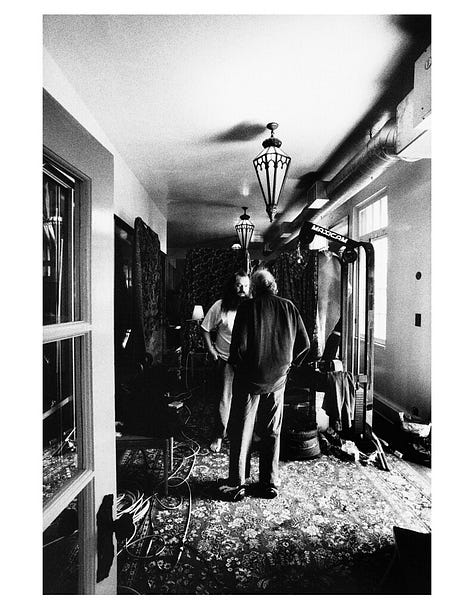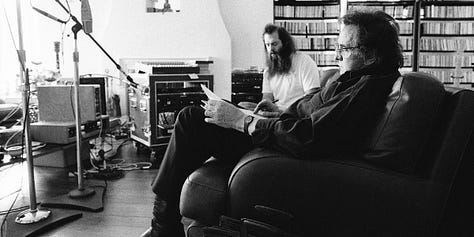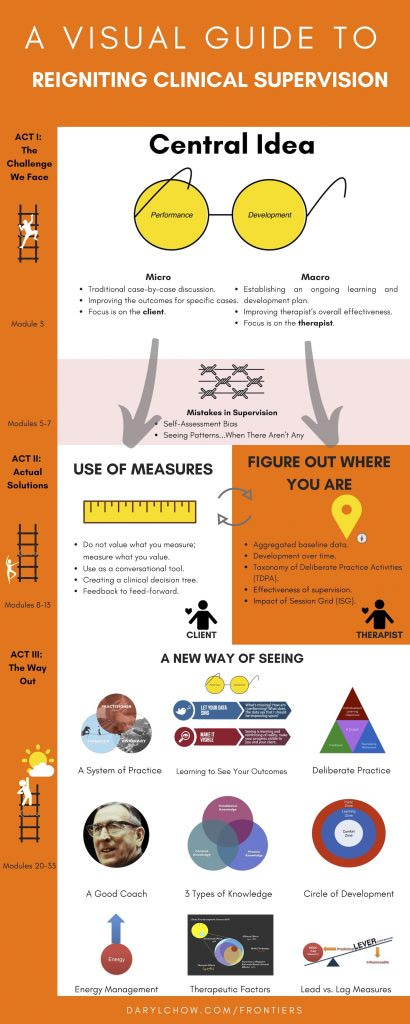The Skills of a Clinical Supervisor is not the Same as the Skills of a Therapist.
Most of us are not trained in the skills of being a clinical supervisor. We think that the skills of both roles are the same—but there are distinctions.
We take a pause from Frontiers Friday this week (recovering from covid and now my wife). A lot more in the pipeline over the next few months.
If you’ve missed the previous series on Existence (Parts I to VI), feel free to return to our Archive.
I want to take this chance to invite clinical supervisors to join Reigniting Clinical Supervision (RCS).
Are you a clinical supervisor?
Check out the course Reigniting Clinical Supervision (RCS)!
The Skills of a Clinical Supervisor is not the Same as the Skills of a Therapist.
One of the common assumptions we make is that the skills of a clinical supervisor is the same as the skill of a psychotherapist.
Certainly there are its overlaps, but I would argue that while a therapist requires well-honed interpersonal skills1 within the therapeutic context (not just someone who has the gift of the gap in social situations), a supervisor requires the ability to not only coach for performance on a case-by-case basis with a supervisee’s stuck case, but also coach for development, which is the ability to see the bigger picture and plan for the long game on how to help each supervisee develop as a therapist.
Johnny Cash and How He Came Alive Near the End of His Days
“[He] showed up in my life in 1993,” said the legendary country/folk sing songwriter, the late Johnny Cash. He was referring to Rick Rubin.
Rubin was known for working as a producer with alternative rock bands like Red Hot Chili Peppers, Nice Inch Nails, AC/DC, and death metal acts like Slayer. He also co-founded the renowned Hip-Hop outfit Def Jam. Cash described the possibility of collaboration as “pretty unlikely.”2
“He’s the ultimate hippie, clad on top but with hair down over his shoulders, a beard that looks as it it had never been trimmed (it hadn’t), and clothes that would have donee a wino proud.”
Given the skepticism, Cash asked Rubin how he’s going to record him as a producer. What is he going to be doing differently from what everyone else had tried. Besides, suffering from health issues and recovering from a lapse in his drug addiction, Cash was feeling low and not knowing where he should go. That said, he was firm-footed that he didn’t want to record on Rubin’s label and “be marketed on the alternative music scene or to the rock n’ roll crowd… I have no illusions about who I am, how old I am, and what a stretch it might be to relate to these young people.”
Here’s what Rick Rubin said,
“I won’t do anything… You’ll do it. You’ll come to my house and sit down in my living room and take a guitar and start singing. At some point, if you want me to, we’ll turn on the recorder, and you will try everything that you ever wanted to record, plus your own songs, plus new songs I might suggest that you love… I’m not very familiar with a lot of the music you love, but I want to hear it all.”
That’s what they did.



Just Rick, Johnny’s voice and his acoustic guitar. Rick listened to him into being.
In his autobiography, Cash said,
“(I was)… wrong (about Rubin).”
Johnny Cash had nearly given up on life by the early 90’s. Rick Rubin re-awaken his life. They ended up recording 5 critically acclaimed album series, The American Recordings. (Listen to this short NPR interview with Rick Rubin. Many of the songs were recorded in Rubin’s living room and not in a recording studio)
In the music documentary Soundbreaking, Rick Rubin said,
“A lot of my job is like being a therapist. You want to make them feel so safe when they open themselves up in such a vulnerable moment, and show themselves so completely.”
Rubin also pushed Cash into a direction he normally wouldn’t take, like covering a metal song by Soundgarden, Rusty Cage. (Cash initially reply was I can’t imagine myself doing this (song)).
The similar task of a supervisor and a therapist is perhaps to be able to create an environment that welcomes the vulnerable side, and explore further into the therapist’s frontier.
Johnny’s daughter, Rosanne Cash, also a musician in her own right said “Rick was like his angel. He came and set him(Johnny) free….Remember, this is who you are.”
Listen to Johnny Cash’s cover of Nine Inch Nails, Hurt.
Every Therapist Needs a “Rick Ruibin”
The thing is, supervision a different skill-set.
Clinical Supervision requires you to be a coach for performance and a coach for therapist development. This is why I think supervisors are better off calling themselves coaches.
Nevertheless, every therapists, be it a rookie or a seasoned professional, needs a “Rick Rubin.” to guide them towards their leading edge.
I wouldn’t expect Rick Rubin to play and sing so earnestly with so much evocation of feelings the way Johnny Cash does. Likewise, I wouldn’t expect Cash to have a producer/sound engineer set skills to guide, nurture and capture the songs the way Rubin does—maddening so with a wide-array of different genres and personalities.
As a supervisor, you’d need to be able to work with a therapist “backstage“.
Here’s an infographic over view of the Reigniting Clinical Supervision course that takes you each step of the way to become a “Rick Rubin” for the therapists that you work with, and bring the art of timeless therapy forward.
Note: The Skills of a Supervisor is not the Same as a Therapist was first published in Frontiers of Psychotherapist Development, 15th of Jan 2020.
Footnotes:
See a series of studies by Tim Anderson and team. Here’s two:
a. Anderson, T., Crowley, M. E. J., Himawan, L., Holmberg, J. K., & Uhlin, B. D. (2015). Therapist facilitative interpersonal skills and training status: A randomized clinical trial on alliance and outcome. Psychotherapy Research, 1-19. doi:10.1080/10503307.2015.1049671
b. Anderson, T., Ogles, B. M., Patterson, C. L., Lambert, M. J., & Vermeersch, D. A. (2009). Therapist effects: Facilitative interpersonal skills as a predictor of therapist success. Journal of Clinical Psychology, 65(7), 755-768. doi:10.1002/jclp.20583
From Johnny Cash’s autobiography, Cash. See also the music documentary Soundbreaking.







Hi Daryl! I'm just sending good wishes that you and your family all make a good recovery from Covid!